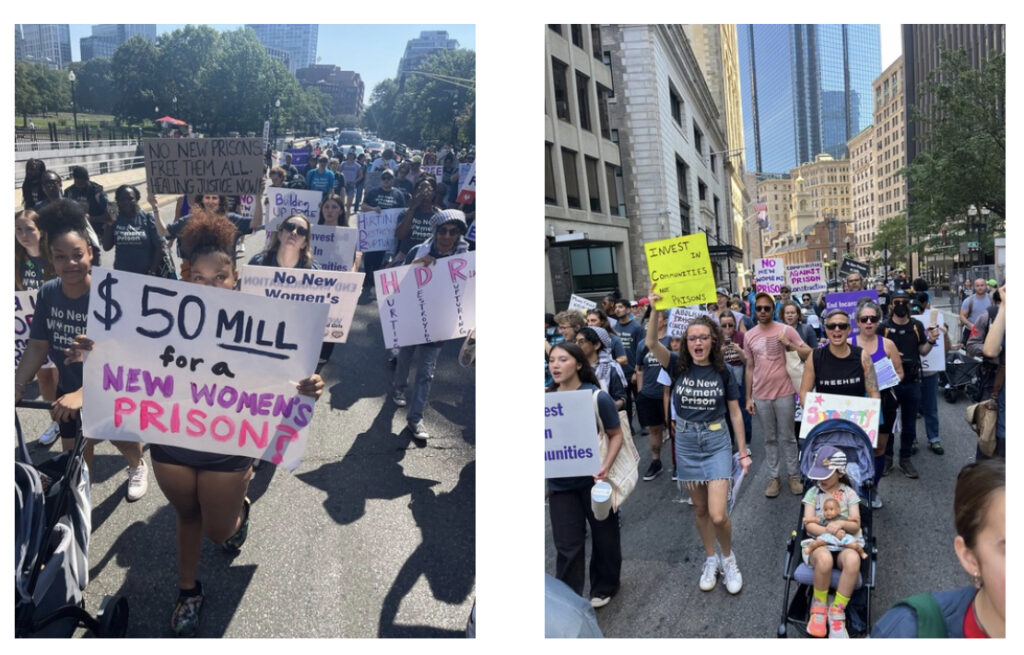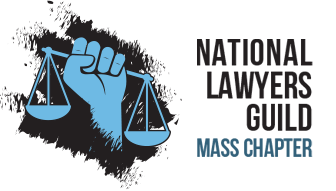This September, Families for Justice as Healing and The National Council for Incarcerated and Formerly Incarcerated Women and Girls organized our fourth annual #FreeHer March in Massachusetts to uplift our collective demand to stop the planned $50 million women’s prison project. We are grateful for the support of NLG legal observers at the march. Movement lawyers are integral comrades in our struggle to end the incarceration of women and girls.

Families for Justice as Healing (FJAH) and The National Council were founded by Andrea James and the women she was incarcerated with at FCI-Danbury. Almost fifteen years later, we are abolitionist organizations who continue to be led by incarcerated and formerly incarcerated women with lived experience, policy expertise, and a brilliant vision for what our communities can, will, and must look like beyond policing and prisons. We call that vision Reimagining Communities and we are organizing on the ground to create what different looks like.
FJAH and The National Council, our members inside MCI-Framingham, our members who have survived incarceration at Framingham, our volunteer base called Building Up People Not Prisons, public health experts, clergy and faith leaders, our partners, and supporters know for certain we know we do not want or need a new women’s prison – now or ever again. This legislative session, we made history when we organized and supported incarcerated people to testify at legislative hearings virtually from prison. Over two dozen incarcerated women testified in favor of passing the Jail and Prison Construction Moratorium to stop the new women’s prison and Elder Parole to create a pathway home for our elders.
Incarcerated women were courageous and unequivocal: prison can never be a safe place. The Massachusetts DOC is notorious for physical and sexual violence against incarcerated people, and extreme neglect of people’s physical and mental health. “It doesn’t matter how shiny the floors or how new the walls are, building a new prison won’t make the real problems go away,” testified Christen Longley. “Instead use the money for treatment, programs, resources to help better lives, instead of locking them up without a chance to do what is right. Prisons never were and never should be an answer. I needed a place to feel safe. I didn’t get that, and so I am here.” The vast majority of incarcerated women are survivors of violence and trauma themselves, and often those experiences at the root of their incarceration. Incarceration only causes further harm.
Incarcerated women are mothers, grandmothers, daughters, aunts, sisters, wives, girlfriends, and beloved community members. “When I look around at all these amazing women I see artists, counselors, business women, and leaders,” Isadora Castro testified from Framingham. “There is so much potential and intelligence behind these walls, but we aren’t being invested in.”
The longest serving woman in MCI-Framingham testified at the hearing on the Prison Moratorium. Her name is Melissa Cordle, she has served almost 40 years, and she is in her mid-seventies and wheelchair bound. She spoke up for alternatives to incarceration and pathways to release for aging and sick women given. She said, “We don’t need a new prison. We need a new administration. It would just turn around and take the problems we have to a new prison.” We encourage you to listen directly to the voices of incarcerated women: bit.ly/FraminghamTestimony.
Following their advocacy against new prison construction, over fifty women signed a letter to the Healey administration about the dehumanizing treatment by the Department of Correction and incarcerated women’s demands for a different path forward. This was a massive and courageous effort because people incarcerated in the DOC can be punished for signing the same piece of paper. While there are some self-led groups at a few men’s prisons in the Commonwealth, women have repeatedly been denied the right to meet together with their own agenda.
“Most of us incarcerated at Framingham feel this is the worst our quality of life has ever been, and so we must continue to push for meaningful changes for us and the women of the Commonwealth,” incarcerated women wrote. “Our treatment by recent superintendents is a reflection of the entire Department’s focus on control and punishment – not care, and by extension not rehabilitation nor successful reentry.”
“Women at MCI-Framingham are clear that we do not need or want another women’s prison, or even massive construction at the existing prison. We are much more concerned with the lack of accountability of the administration and the mismanagement of Framingham which has caused serious harm and trauma in our lives.” You can read the letter in its entirety, and a letter of support signed by more than 40 organizations here: tinyurl.com/Framinghamletter.
So far, incarcerated women’s courage and advocacy has been ignored by both the Massachusetts legislature who failed to pass the Prison Moratorium and Elder Parole and the Healey administration who has not released a single person so far on clemency. Yet, incarcerated and formerly incarcerated women continue to organize with an undaunted spirit of spirit and dreams of freedom and dignity.
This is the organizing that has derailed the $50 million women’s prison project for five years. During that time, we have fought hard to free more women from Framingham and establish the pillars of Reimagining Communities to protect our people from entanglement in the system, meet people’s needs coming home from prison, and heal from the trauma and economic devastation caused by incarceration. Those programs include a guaranteed basic income and rental assistance program for directly impacted women, a paid commercial’s drivers license course for formerly incarcerated people, healing and transformative justice spaces, a community pantry, tens of thousands of dollars in mutual aid, and participatory defense.
Participatory defense supports people who are being prosecuted and incarcerated people fighting for their release, including parole preparation. We used our lived expertise and organizing experience as directly impacted people to collaborate with defense attorneys and law students to collectively fight for the best possible outcomes in each case – as well as shift the oppressive power dynamics and culture of the court. We are also recruiting and organizing attorneys and law students to take on clemency petitions pro-bono for incarcerated women who are sick, aging, survivors of violence, and have served decades of time. We hope to continue working with defenders and movement lawyers on every front to free our people, while we maintain a laser focus on emptying MCI-Framingham and closing it without ever rebuilding or replacing it. On the steps of the statehouse at the 4th annual #FreeHer march, one of our beloved members called from Framingham. Here’s what she read over the phone:
Hi, I’m Pat Olsen. I’m 60 years old and am currently serving Life Without Parole. I’ve been incarcerated since February of 2005. Words cannot express the gratitude, respect and appreciation I have for all of you. You take the time out of your busy schedule and be away from your family to speak for us.
Thank you, for being our voice. Thank you for caring about us. Thank you for fighting for us, and Thank you for giving us hope.
Without people like you, we the incarcerated would continue to die behind these walls. Instead, you fight to change laws. You fight to place people in powerful positions that understand the inequalities and injustices that exist. You fight for change.You are all true warriors.”
Together, we can make it possible to be the first state in the country with no state prison for women. Free her!



